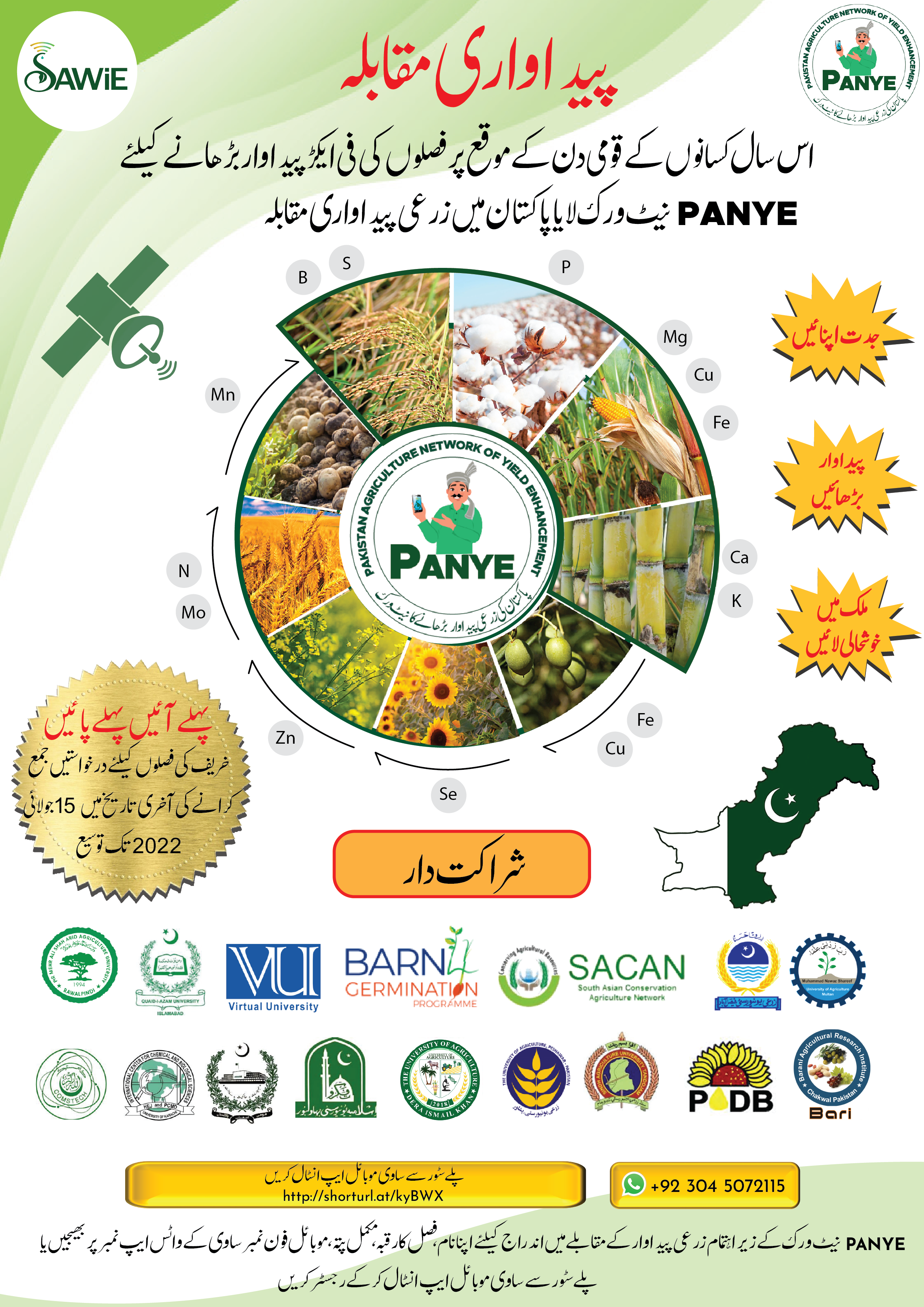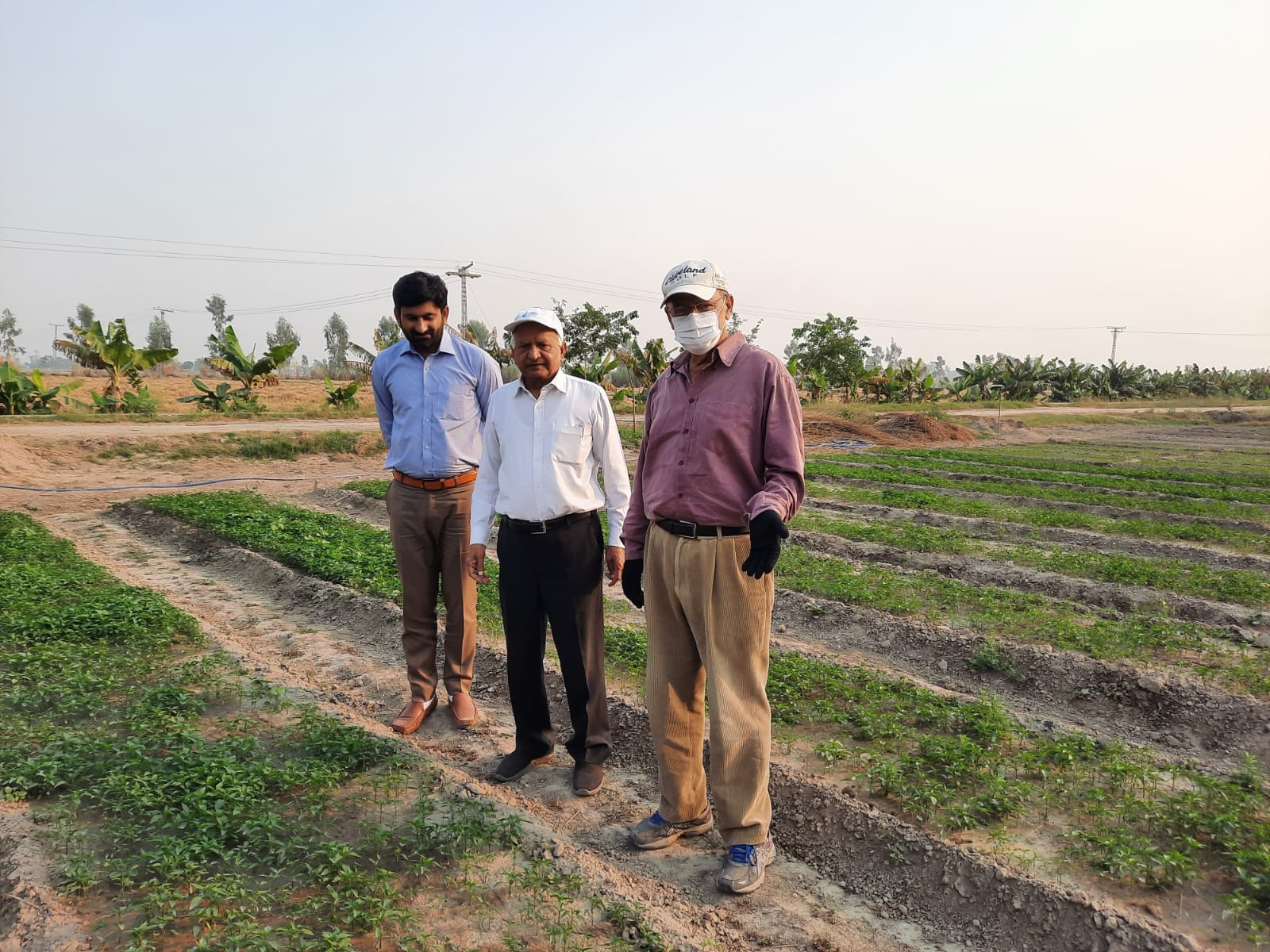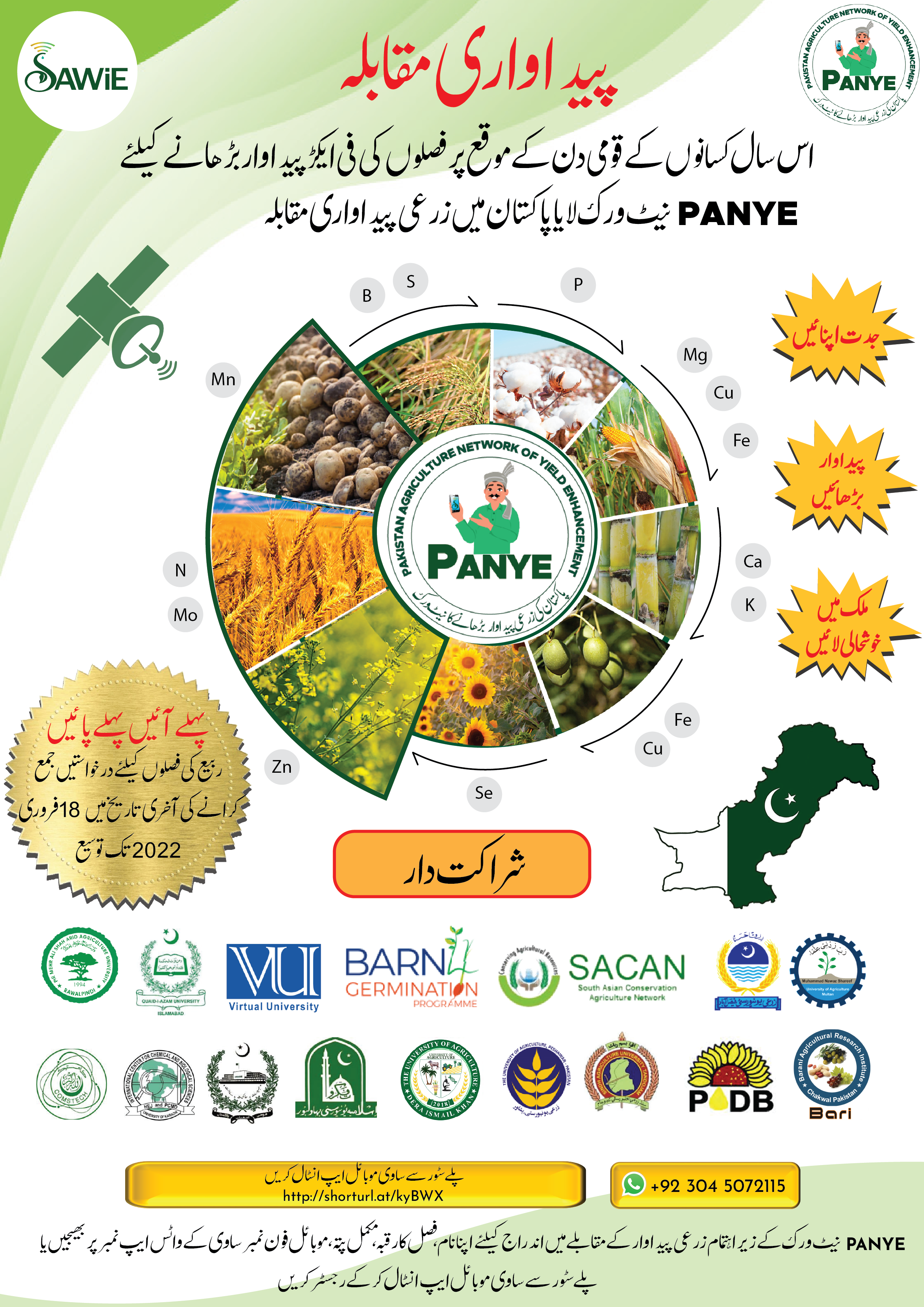Pakistan Agriculture Network of Yield Enhancement (PANYE)
Pakistan National Kissan Day
18th December 2021
PANYE@sawie.net Tel: 03301762023
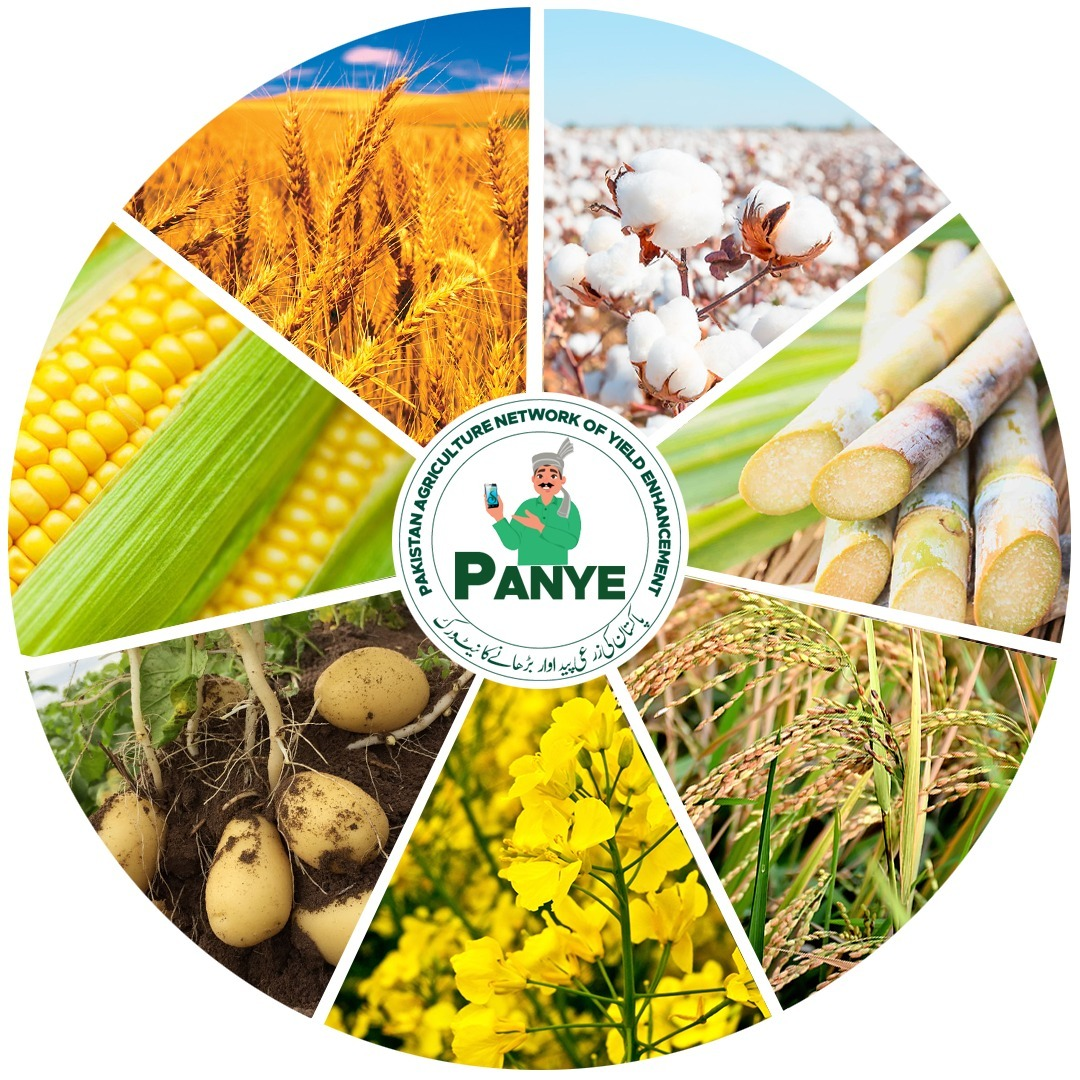
The average yield of Pakistani farmers is quite low as compared to the rest of the world. There is a significant difference between small holders and progressive farmers within the country. On average there is a yield gap of up to 50 % on smallholders’ farmers compared to yield potential. The small holders (less than 12.5 acres) accounts for 89% of the farmers in Pakistan and own about 50% of the land.
| Yield (Maunds/acre) | Avg. Farmer | Progressive Farmer |
|---|---|---|
| Wheat | 29 | 45 |
| Rice | 50 | 80 |
| Sugarcane | 656 | 950 |
| Maize | 57 | 80 |
| Cotton | 18 | 35 |
Source: Govt of Pakistan Agriculture Transformation Plan 2021
Pakistan’s agriculture faces serious challenges of water shortage, declining soil health, the threat of invasive pests & diseases due to climate change which influence crop productivity and ultimately farmer’s income. Agriculture in Pakistan needs to achieve Net Zero emissions to be competitive locally and internationally. The way crops are planted, sowing methods, irrigation management and use of inputs have a direct impact on crop yield. Water productivity & nutrient use efficiency has a major role in cutting down losses and Greenhouse gasses emissions.
Climate change is posing a serious threat to the agriculture sector in Pakistan with a severe shortage of water affecting two of its main staple crops of Rice and wheat (Ahmad et al., 2015). It is reported that the per capita annual water availability in Pakistan has dropped to 1,017 cubic meters from 5300 in 1947 and may lead to absolute water scarcity by 2025 (UNDP 2016). This will result in severe water shortages for the next generation of farmers. Future water requirements and challenges impose a serious threat to Pakistan due to its agrarian economy where wheat and rice are primary food crops (Ahmad et al., 2019). There is an urgent need to develop innovative solutions for efficient and sustainable use of water supplies for crop production.
“Soil is life, there is no soil without life, and no life without soil. We don’t need more land. We need to better use what we have, you can import everything , except land and water, we need to invest more on water and soil health, we have to bank on our finite resource” says Professor Rattan Lal, Professor Rattan Lal of Ohio State University, World Food Prize Winner 2020.

Source: The Massachusetts Healthy Soils Action Plan, The Institute for Local Self Reliance
Pakistan Nitrogen use efficiency has decreased over a period of time due to decline in soil organic matter. The Nutrients use efficiency (NUE) was 58% 1960-1965 with surplus of 42% (171Gg) compared to 2009-2013 where NUE is reduced to 23% and surplus has increased by 77% (3581 Gg).

Fig. 1. (A) Chronological increase in N fertilizer application (kg/ha) in Rice-Wheat (B) decrease in nitrogen use efficiency (NUE) of Rice-Wheat production in Pakistan (FAO data).
What is PANYE?
PANYE- stands for Pakistan Agriculture Network of Yield Enhancement. This is the first National competition of farmers across Pakistan to compare their crop yield and costs. It is led by an independent unbiased advisory service -SAWIE with representatives of research and industry. PANYE will conduct the farm comparison that includes the crop yield of major crops selected for this network. It will calculate cost-benefit analysis and benchmarking achievements of the selected farmers at the end of each crop season. It covers both crop seasons of Pakistan that includes Rabi and Kharif crops.
SAWIE (www.sawie.net) is a digital platform that consists of a smart Ap. SAWIE is an independent, unbiased farm advisory service to guide farmers from seed to seed crop management. It is using Satellite Applications for crop monitoring and on ground experts’ knowledge to issue advisory alerts. SAWIE was launched by the Honorable President of Pakistan on the World Food Day on 14th October 2021 in Islamabad.
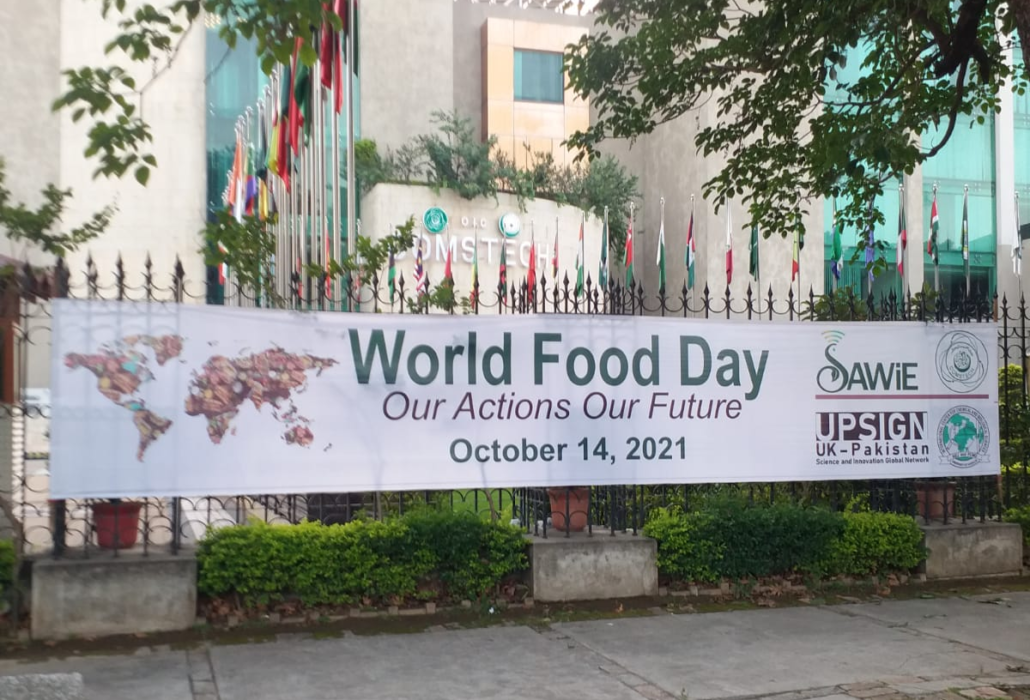
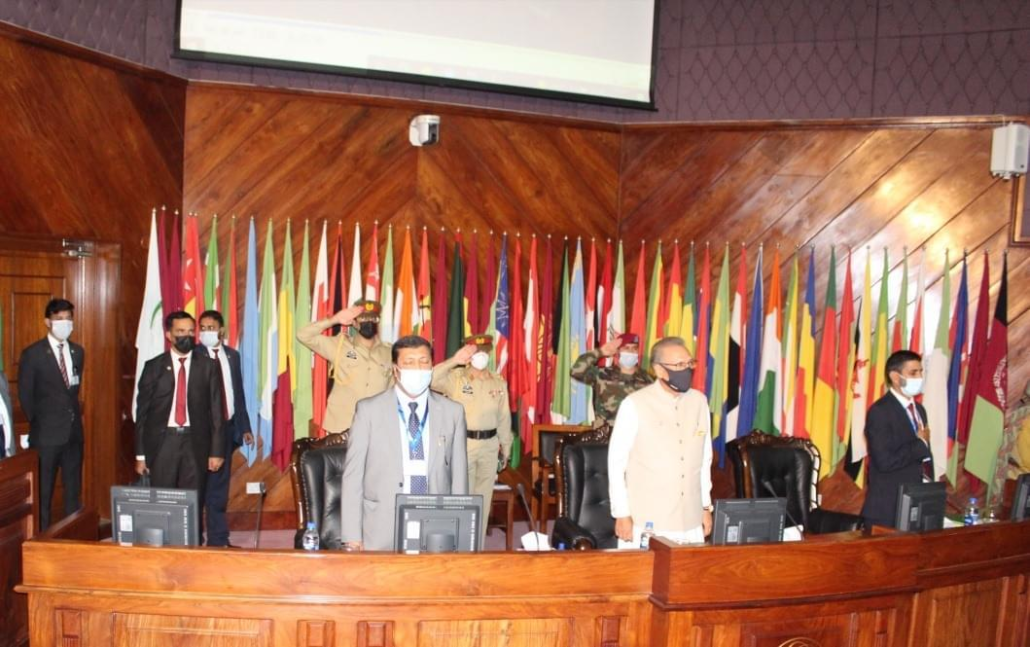
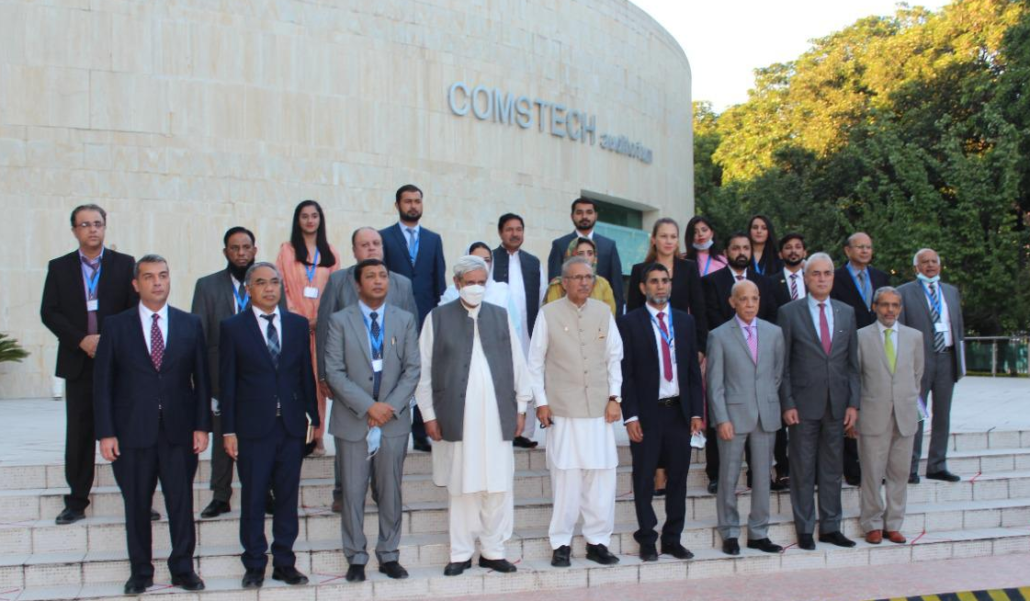
SAWIE Launch on the World Food Day 14th October 2021, Islamabad, Pakistan
Farmer success story (Prof Dr Abul Fazal, Zaidi Farms)
Zaidi Farm, wheat cultivation, Sheikhupura, November 2021
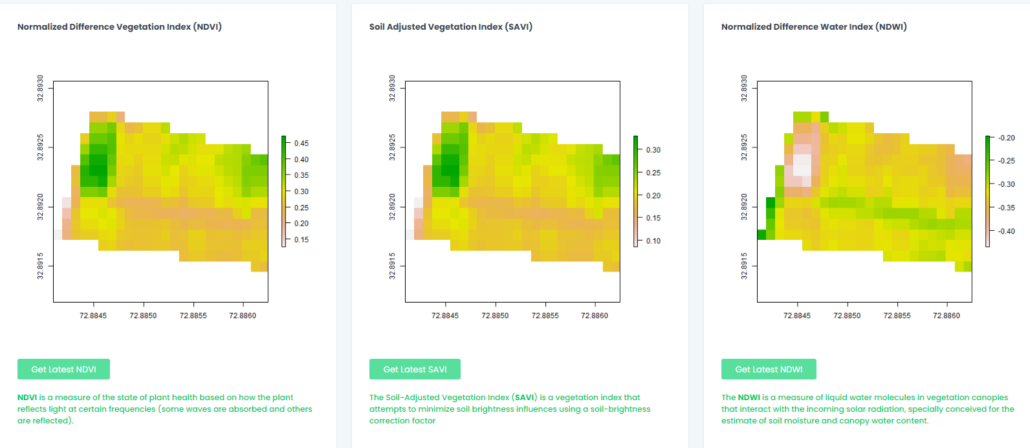
Satellite Crop Health Maps for crop growth and early anomaly detection
Objectives
The objective of PANYE Network is to support fast transfer of innovative solutions to farmers. The farmers can share the impact of new farm interventions. This will help to outreach the farmers to improve their productivity and income through creating an environment of competition amongst them.
- Share beneficial management practices (BMP) among farmers.
- Improve yield per acre through judicious use of inputs in the right amount at the right time without compromising environment.
- Improving water productivity.
- Improve Benefit Cost Ratio (BCR).
- Capacity building of farmers through linking farming with experts from Academia & Research.
PANYE Launch
The PANYE was launched on Kissan day on 18th December 2021. The network has opened new avenues to promote farmers’ education and innovation through use of a digital platform. This will connect farmers all over Pakistan to share beneficial management practices. The network has support from credible universities and research organisations of Pakistan. This will help to capture the crop growth of major crops over a season and calculate its cost-benefit ratio. The Network will engage with farmers for various cropping systems across Pakistan that include Rice-Wheat, Wheat-Cotton, Wheat-Maize, Mixed system, etc. The network will capture beneficial management practices, innovations in tillage methods, use of water saving technologies and irrigation management. The network will promote the climate smart agriculture. The network will encourage the female farmers and young farmers to come forward through capacity building and networking.
The selected farmers of the PANYE will be visited by experts. The farmers joining the network will be required to provide details about their crop from seed to seed, covering tillage methods, soil analysis, varieties’ names, date of sowing, application of inputs, their name and date, harvesting date, and yields. The farms will also be monitored remotely using the data collected through satellites and farmers sharing their crop pictures.
The farmers will be trained through educational videos about the crops. The farmers will be regularly sent advisory alerts about the weather and potential threats from pests and diseases, droughts & heavy rainfalls, storms, etc. Farmers will be asked to provide their crop management data, e.g. sowing dates, irrigation dates, fertilizer applied, name of the chemical and amount used, cost of their inputs. This will help to produce a cost of production map of the farm for a particular crop.
Farmers from all over Pakistan will be registered in in the network during the crop season of a selected crop. The individual crop promotion will be carried out before the sowing season of a particular crop so maximum farmers can take benefit of PANYE.
The PANYE network launch took place on 18th December, following are the images of the event.
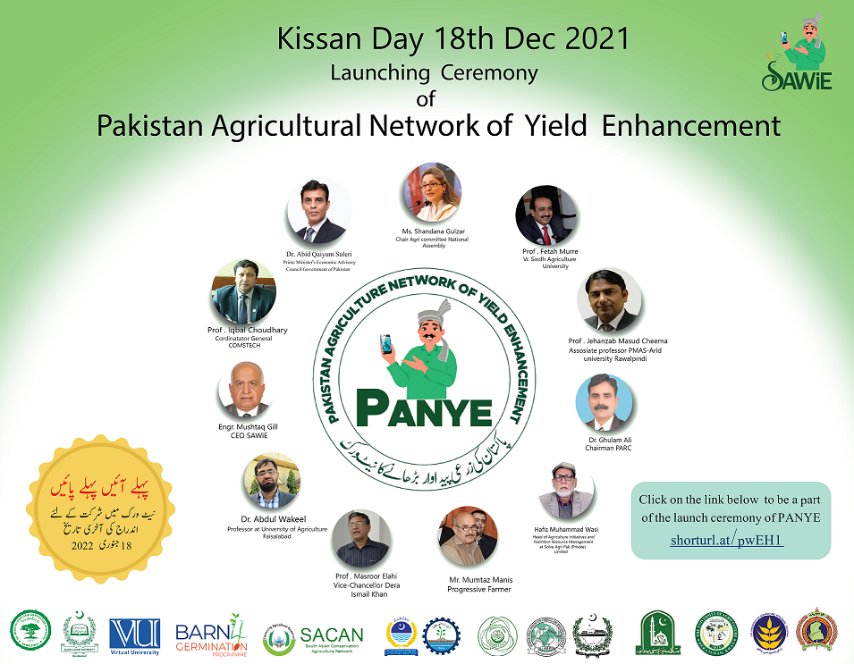
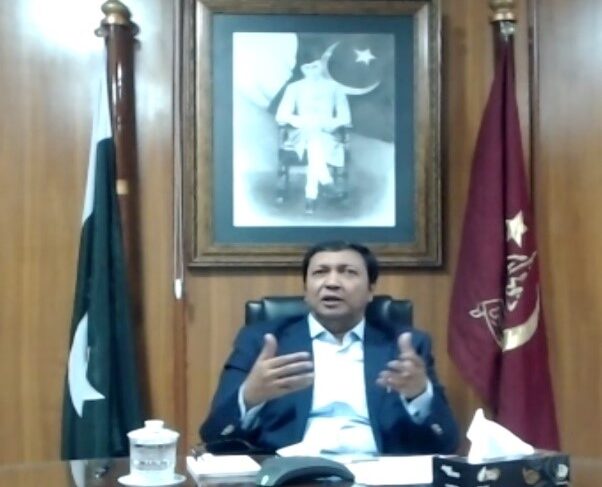
Prof Iqbal Choudhary, Coordinator General, COMSTECH
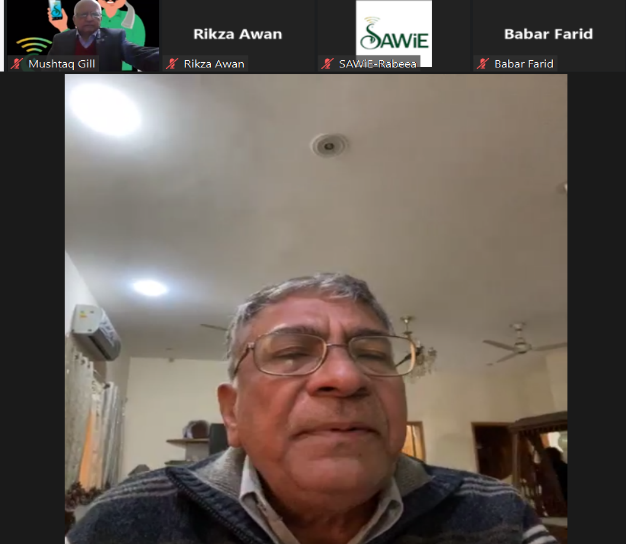
Prof Masoor Babar, VC, DI Khan University of Agriculture
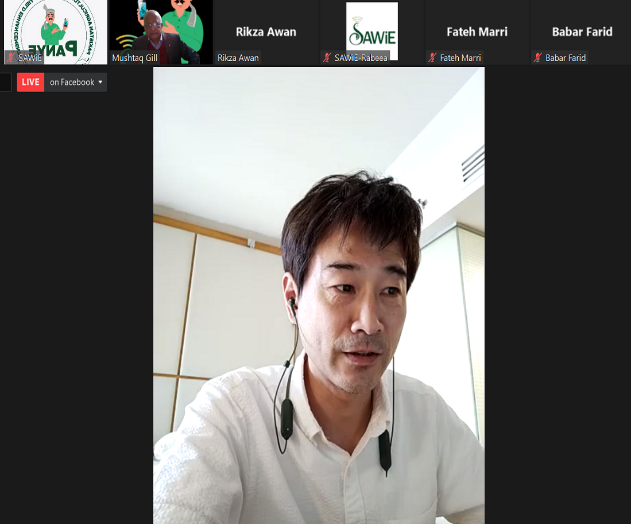
Mr Kenta Ohno, JICA consultant
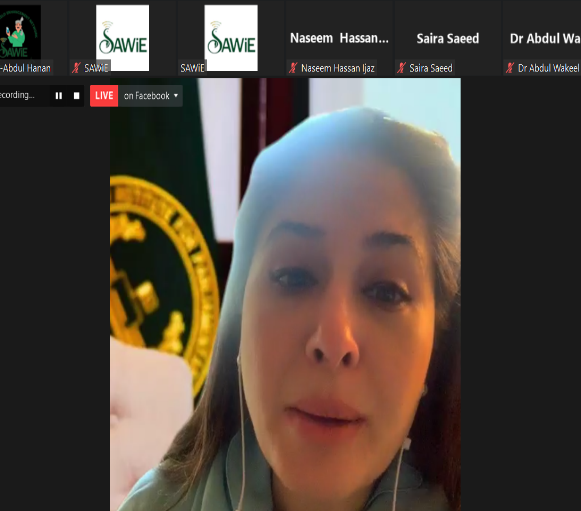
Ms Shandana Gulzar, National Assembly of Pakistan

Eng. Mushtaq Gill (TI), CEO SAWIE

Dr Abdul Wakeel, University of Agriculture Faisalabad
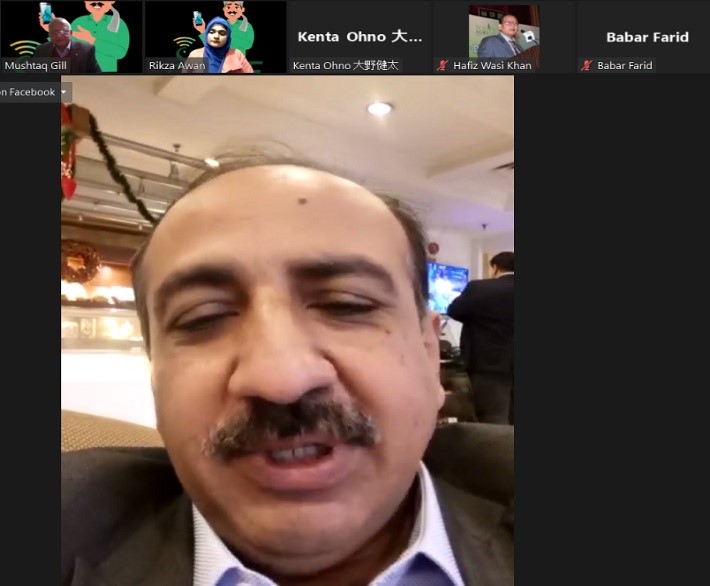
Prof Dr. Fateh Mari VC, Sindh Agriculture University Tandojam
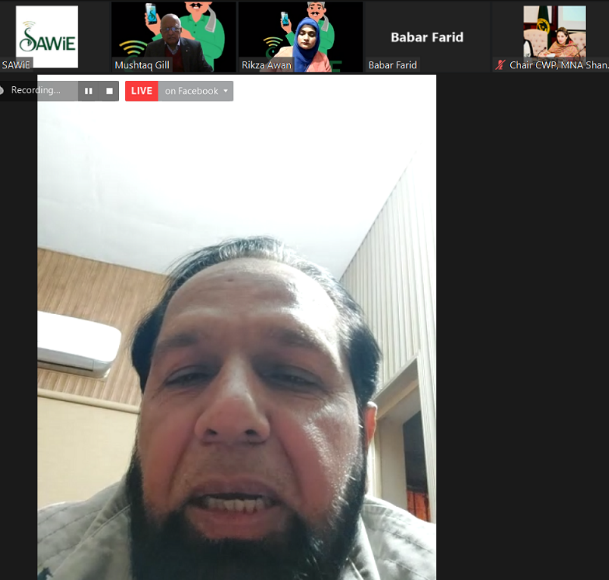
Dr Saghir Ahmed, Director, Cotton Research Institute
Target Crops
PANYE has selected eight major crops in its first round for 2021-2022 crop season. Other crops will be included in the next round that would include horticulture crops, etc. This year’s crops include:
- Wheat
- Rice
- Cotton
- Maize
- Sugarcane
- Potatoes
- Canola
- Sunflower
Research Partners
PANYE has engaged with the key research and educational institutions that includes COMSTECH (OIC commission on science & technology). It has also got partnership with the renowned Universities in Pakistan delivering education in Agriculture, Biological, Environmental sciences to support the knowledge transfer to farmers through expert advisory. SAWIE has MOU with most of the universities that have showed interest in delivering impact on the farming and rural sector of Pakistan. The faculty member will be engaged in training and capacity building of the network farmers in their region. Students will also be involved through internships. The universities include, University of Agriculture Faisalabad, University of Agriculture Peshawar, PMAS Agriculture University, Sindh Agriculture University Tandojam, MNS University of Agriculture Multan, DI Khan University of Agriculture, IUB Bahawalpur, Qaid e Azam University, Karachi University, ICCBS, University of Kotli, UET Lahore, Fatima Jinnah University, Pak-Austria Fachhochschule, Institute of Applied Sciences and Technology, Virtual University, TEVTA, Pakistan Agriculture Scientist Forum (PASF).
PANYE has also secured support from the agriculture industry, farmers, input suppliers, Banks, and rural sector related stakeholders. It has also got support from the world’s leading universities and research institutes from the UK too. This includes, UK Pakistan Science and Innovation Global Network (UPSIGN), University of Leicester.
Farmer’s Benefits
The farmers who opt to join the PANYE will have access to SAWIE Knowledge hub, expert advisory, access to satellite imagery of their fields, enabling them to facilitate their decisions about seed, irrigation, fertilizer, and crop management.
The farmers will get advantage of engaging with the PANYE experts from academia, research, and agribusiness sector to access the new innovations.
There is no fee to join this competition. The top three winners per crop will be awarded Gold, Silver, and Bronze Medal along with recognition at National level.
- Access to remote advisory services on a regular basis for irrigation, fertilizer, pests & disease management, and warning.
- Satellite monitoring of the mapped field.
- Real-time weather data through SAWIE App
- Ask an expert & Engage with Universities and Research Organizations
Farmers Entry Requirements
- Only individual farmers are eligible, companies-owned, or corporate farms are not eligible.
- Farmers (male & female) of a minimum age of 18 years and above
- Young & innovative farmers will be given preference
- Women farmers are encouraged to apply
- Minimum 5-acre is required, there is no limit on overall farm size
- One farmer can only participate for a maximum of two crops per year
- Farmers with a smart phone from all over Pakistan are encouraged to participate (AJK, Balochistan, Gilgit & Baltistan, Punjab, KPK, Sindh)
- Willing to share information about soil, seed variety, Irrigation, fertilizer application, crop management data, crop yield at the time of harvest on SAWIE App
- Agree to Install SAWIE App and use it regularly.
Selection process
Farmers who meet the above-mentioned criteria and agree to share data about soil, water and crop management practices, costs, etc using SAWIE App.
- Competition slots are limited- first come first get participation into competition.
- Joining the competition is completely voluntary
- SAWIE and its panels do not take any responsibility for any loss or damage caused to crop or farmers related to the network.
Selection Criteria
There are seven award categories per crop. Each category will have further three winners (Gold, Silver and Bronze). These award categories are.
- Economical & sustainable Yield
- Climate Smart Agriculture Farm Innovation (soil health, irrigation, fertilizer, pesticides, harvesting, quality, nutrition, post-harvest losses)
- Water Productivity
- Young Farmer
- Women Farmer
- Crop Residue Management
- Farmer entrepreneurship/ service provider/ innovative marketing
Three top winners will be awarded based on the assessment of crop data using novel methods of satellite applications. The data will be evaluated by a panel of experts for each crop comprising of academic, research, farmer representatives and industry experts.
PANYE Farmer Membership
The farmers interested to take part in the program need to provide the information below via WhatsApp or signing up on SAWIE App. The signing up to PANYE Network is voluntary. As pre-requisite to become a member, the farmers have to subscribe SAWIE YouTube channel for farmer education and training for free and download the app. The last day for registration is 18th January 2022.
1-Name
2-Crop area: Wheat, Cotton, Sugarcane, Rice, Maize, Potatoes, Oilseeds -Canola & Sunflower.
3-Address
4-Mobile number (WhatsApp)
5- Competition Category, choose a category of competition, 1-7 (can choose up to 3 options but will be only awarded one award),
- Economical & sustainable Yield
- Climate Smart Agriculture Farm Innovation (soil health, irrigation, fertilizer, pesticides, harvesting, quality, nutrition, post-harvest losses)
- Water Productivity
- Young Farmer
- Women Farmer
- Crop Residue Management
- Farmer entrepreneurship/ service provider (marketing, etc)
Competition Timeline
- Competition timeline – 18th December 2021
- Farmers’ registration -18th January 2022
- Crop season 1- Rabi Crops- Field data and crop monitoring
- Data Review April-May 2022
- Crop season 2- Kharif Crops- Field data and crop monitoring
- Data Review November 2022
- Winners’ announcement- Annual Kissan Day December 18th, 2022.
Research Partners
PANYE has secured support from all major universities of Pakistan that include the agriculture universities , other universities and organisations leading agriculture research & development. SAWIE has a support from Federal Government and Provincial Government agencies. It works very closely with Pakistan Agriculture Research Council (PARC), Pakistan Council of Research in Water Resources (PCRWR)and other agencies.

